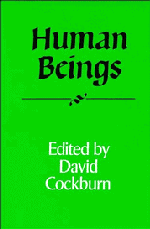Book contents
- Frontmatter
- Contents
- Introduction
- Machines as Persons?
- The Importance of Being Human
- Response to McNaughton
- Response to Diamond
- Real Selves: Persons as a Substantial Kind
- Personal Identity and Brain Transplants
- Personal Identity and the Idea of a Human Being
- Imagination and the Sense of Identity
- Radical Critique, Scepticism and Commonsense
- Getting the Subject back into the World: Heidegger's Version
- Incarnational Anthropology
- How Many Selves Make Me?
- Sartre and Our Identity as Individuals
- Bibliography
- Notes on Contributors
- Index
Sartre and Our Identity as Individuals
Published online by Cambridge University Press: 05 February 2015
- Frontmatter
- Contents
- Introduction
- Machines as Persons?
- The Importance of Being Human
- Response to McNaughton
- Response to Diamond
- Real Selves: Persons as a Substantial Kind
- Personal Identity and Brain Transplants
- Personal Identity and the Idea of a Human Being
- Imagination and the Sense of Identity
- Radical Critique, Scepticism and Commonsense
- Getting the Subject back into the World: Heidegger's Version
- Incarnational Anthropology
- How Many Selves Make Me?
- Sartre and Our Identity as Individuals
- Bibliography
- Notes on Contributors
- Index
Summary
Identity: ‘Sameness of Person’ and ‘Authenticity of Self’
The question about ‘identity’ under consideration in this paper is different from the one discussed in some of the other papers—for instance by Geoffrey Madell and Lars Herzberg. That question arises from the fact that human beings change in appearance and behaviour in the course of their life. By and large we have no trouble in recognizing them but we may wonder what it is that remains the same in them or about them so that we recognize them, address them by the same name, respond to them as to someone we know. What is it for a person to be the same person through these changes? By virtue of what do we call them by the same name?
The question I am concerned with is different. It is related, however, to the question about multiple personality discussed in another paper at this conference. Thus suppose that someone calls herself Sally in the mornings and Emma in the afternoons, displays two different personalities and has very different memories which show little overlap. We may wonder: Who is she really? Is she simply Sally and Emma alternately, or is Emma no more than a personality that comes over her and possesses her, as this may happen through hypnotic suggestion? Or is this the case with both Sally and Emma so that she is the person she would become if and when she stops being Sally and Emma and has a chance to ‘come to herself’ in learning to meet people without acting these parts—if ‘parts’ are what they are?
- Type
- Chapter
- Information
- Human Beings , pp. 245 - 264Publisher: Cambridge University PressPrint publication year: 1991
- 11
- Cited by



